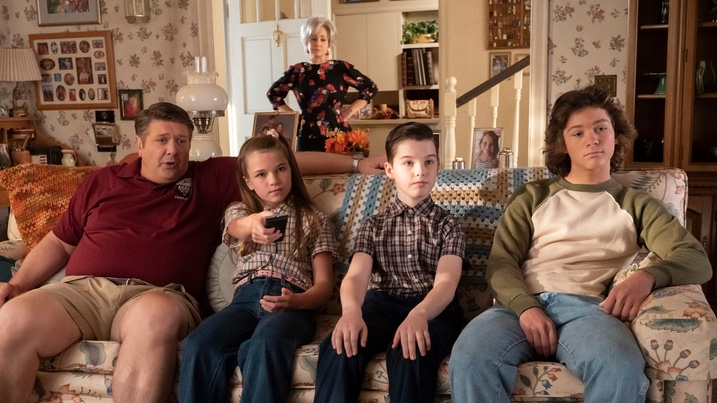
The Struggles of Adolescence: Sheldon’s Tumultuous Year
In Season 3 of Young Sheldon, we see Sheldon entering a new stage of life — adolescence. While his extraordinary intellect remains unchanged, his emotional and social development begins to take center stage. Season 3 is about Sheldon grappling with more personal and internal struggles as he tries to navigate the increasingly complex world around him.
Sheldon’s social isolation becomes more pronounced in this season, and his relationship with his peers reaches new heights of awkwardness. His inability to relate to his classmates is explored even further, particularly as he tries to engage in activities that are typical for children his age — such as joining a science club or trying to make friends in a more traditional sense. These attempts often end in failure or confusion, leading to emotional moments of self-doubt for Sheldon.
Despite his difficulties, Sheldon continues to show resilience, even though his understanding of human emotions and relationships remains remarkably limited. Season 3 explores Sheldon’s need for approval, particularly from his family, and his deep desire for acknowledgment, something that becomes a central theme throughout the season.
Sheldon and George Sr.: A More Complex Father-Son Relationship
In Season 3, the evolving dynamic between Sheldon and his father, George Sr., becomes a focal point. George’s relationship with Sheldon has always been strained due to their vastly different personalities and communication styles. George is more of a “man of action” while Sheldon thrives in the realm of intellect. However, this season provides moments where George begins to understand and appreciate Sheldon’s genius more. It also highlights how George, despite his frustrations with Sheldon’s quirks, is a loving father who wants to help his son navigate life.
One of the season’s most touching moments is when George Sr. steps in to help Sheldon with a personal dilemma. While Sheldon might not always understand his father’s gestures, it’s clear that George’s love for Sheldon is genuine, and he is willing to go out of his way to be there for him.
This season shows Sheldon beginning to realize that not all problems can be solved through logic and intellect — sometimes, it takes empathy and emotional understanding, lessons he begins to learn from his father.
Mary’s Internal Conflict: Balancing Faith and Motherhood
Mary Cooper (Zoe Perry) continues to play a pivotal role in Sheldon’s life in Season 3. As a devout Christian, Mary has always leaned on her faith to guide her through life. However, the challenges of raising a child who doesn’t share her religious beliefs — and whose genius often conflicts with traditional faith-based teachings — cause Mary to question the balance between her faith and her parenting.
Throughout the season, Mary is faced with a series of moral and ethical dilemmas. How does she support Sheldon’s extraordinary intellect without losing her own sense of faith? How does she reconcile her religious beliefs with Sheldon’s logical, scientific worldview? This internal conflict provides some of the season’s most emotional moments.
In addition to her personal struggles, Mary’s role as the emotional glue in the family continues to grow. She often finds herself torn between supporting Sheldon’s unique needs and ensuring that Georgie and Missy don’t feel neglected. Mary’s deep love for her family remains a central theme, even as she grapples with these complex questions.

Sheldon’s Friendship and Attempt at Normalcy
Season 3 brings Sheldon’s desire for friendship to the forefront. As a 12-year-old, Sheldon begins to feel a sense of loneliness that he had previously been able to ignore. Despite his extreme intelligence, Sheldon yearns for companionship, especially since he’s often misunderstood by others.
In an attempt to connect with his peers, Sheldon takes steps to build friendships. These efforts are often awkward, humorous, and unsuccessful, but they show Sheldon’s vulnerability and his deep desire for social inclusion. One key development is Sheldon’s budding friendship with his neighbor, Tam, a fellow genius who is better at navigating social situations than Sheldon. Tam becomes a kind of “social mentor” for Sheldon, though Sheldon still doesn’t quite understand the rules of friendship.
While Sheldon struggles to forge genuine friendships, his relationship with his family deepens. Even if he doesn’t have many friends at school, he realizes that his family is his most reliable source of love and support.
Georgie’s Journey: Finding Himself Beyond Sheldon’s Shadow
Georgie Cooper (Montana Jordan) continues to struggle with his identity in Season 3. As Sheldon’s older brother, Georgie has always felt like the “normal” sibling who doesn’t quite measure up to Sheldon’s genius. Georgie’s struggles to find his place are highlighted throughout the season as he tries to figure out his future and where he fits within the family dynamic.
Georgie’s character arc in this season reflects the growing pains of adolescence, as he faces romantic issues, social pressures, and his own personal insecurities. He often feels overshadowed by Sheldon’s brilliance, but as the season progresses, Georgie begins to realize that his worth isn’t defined by his brother’s achievements.
Georgie’s story is one of self-discovery, and his journey becomes one of the more relatable and heartwarming subplots of the season. Although Georgie’s path diverges from Sheldon’s, it ultimately strengthens their sibling bond.
Missy’s Independence: A Girl Finding Her Own Path
Missy Cooper (Raegan Revord) continues to be a constant source of humor and insight in Season 3. As Sheldon’s twin sister, Missy is often caught in the crossfire of Sheldon’s eccentricities. However, Missy begins to emerge more as a distinct character in this season. While she’s always been the more socially adept sibling, Season 3 explores Missy’s own struggles with her identity, her sense of humor, and the pressures she faces growing up in the shadow of Sheldon’s genius.
Missy’s relationship with Sheldon continues to be one of the show’s most endearing dynamics. She loves her brother but isn’t afraid to call him out when he’s being difficult or unreasonable. She often serves as the voice of reason, offering a balance to Sheldon’s rigid logic.
The Humor and Heart of Young Sheldon: Balancing Family and Growth
Season 3 of Young Sheldon expertly balances humor with heartfelt moments, as the show continues to explore the complexities of family dynamics and growing up. The season showcases Sheldon’s social missteps, his emotional struggles, and his growing understanding of the world, all while maintaining the humor that has defined the series.
The relationships between Sheldon, his family, and his peers continue to evolve, adding layers to each character and providing deeper emotional resonance. Whether it’s Sheldon’s attempt to connect with others or Mary’s struggle to reconcile her faith with her parenting, the season doesn’t shy away from the challenges of growing up — especially when you’re a genius who doesn’t quite fit in.
The humor in Season 3 remains as sharp as ever, particularly in Sheldon’s awkward interactions with those around him. However, the season also explores more serious themes, such as identity, acceptance, and personal growth, making it one of the most emotionally rich seasons of the show.
